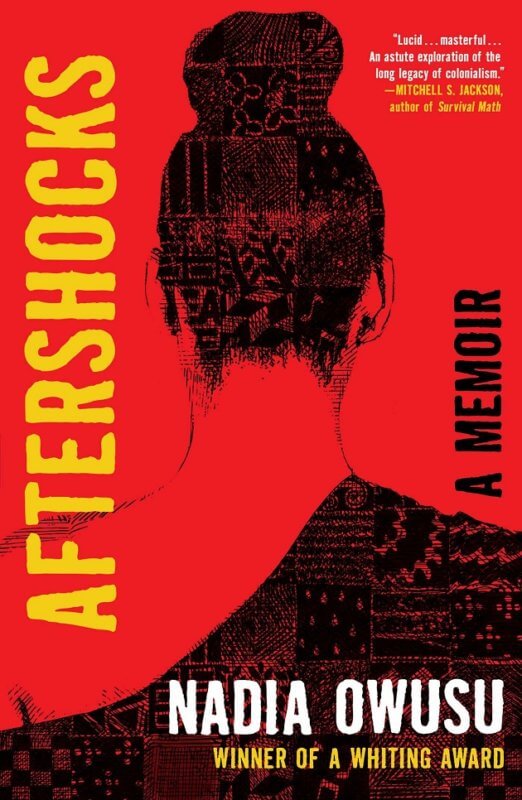14 Dec / Aftershocks: A Memoir by Nadia Owusu [in Shelf Awareness]

 A stepmother’s unwanted visit, a mother’s unexpected phone call, a lover’s departure – all happening in a single month – precipitated the breakdown that eventually engendered Whiting Award winner Nadia Owusu’s penetrating debut memoir, Aftershocks.
A stepmother’s unwanted visit, a mother’s unexpected phone call, a lover’s departure – all happening in a single month – precipitated the breakdown that eventually engendered Whiting Award winner Nadia Owusu’s penetrating debut memoir, Aftershocks.
Owusu spent her youth navigating multiple continents, a half dozen countries, with inconsistent permutations of so-called family. Born to an Armenian American mother, Almas (who deserted Owusu at 2), and Ghanaian father, Osei (whose United Nations career meant repeated relocations), Owusu learned early that “moving on was what we did.” Osei remarried a Tanzanian woman, Anabel; Almas married twice more. Half-siblings arrived on both sides. With Almas estranged and Anabel difficult, Owusu’s only stability was her unwavering bond with her father. When he died before Owusu’s 14th birthday, with nowhere else to go, Owusu endured the rest of her childhood with the negligent, sometimes abusive Anabel.
At 18, Owusu arrived in New York City for college and stayed. A decade later, Owusu reluctantly meets Anabel for a fraught dinner, during which Anabel, in a moment of spite, insists Osei died of AIDS, not cancer. The disturbing allegation begins to mar his near-faultless legacy – that he could have cheated, could have lied – further unsettling Owusu’s already fragile, medicated sense of self. Safe refuge seems to appear in a discarded blue chair she lugs home to her apartment. This one “felt familiar … It felt almost like sitting on my father’s lap.” And there she remained – remembering, reexamining, reliving the many shocks that left her uncertain, untethered. After seven days, she finally rises, ready for “terraforming”: to make her own solid, habitable world.
“I write toward truth, but my memory is prone to bouts of imagination,” Owusu admits in her author’s note. “Others remember events differently. I can only tell my version.” In structuring her truth, the earthquake (purposefully, ironically) remains her leitmotif throughout – its shattering effects, its impending disturbances felt before and certainly long after. Her own “first earthquake” took place at age 7 when the long-absent Almas arrived for a brief, uncomfortable reunion just as a catastrophic actual earthquake in her ancestral Armenia killed tens of thousands. Owusu sometimes works a little too hard to mold her experiences into her seismic theme of faults and shocks. Repetition, too, is occasionally problematic, stalling the already non-linear narrative. But beyond any imperfections, Owusu’s raw vulnerability hauntingly, steadily beckons readers. By gathering “all the places I tried to belong to and all the people I long for,” Owusu wills herself whole.
Shelf Talker: Debut memoirist Nadia Owusu examines the many ways her fractured family and their peripatetic relocations contributed to the aftershocks that led to her mental break at 28.
Review: Shelf Awareness Pro, December 14, 2020
Readers: Adult
Published: 2021
